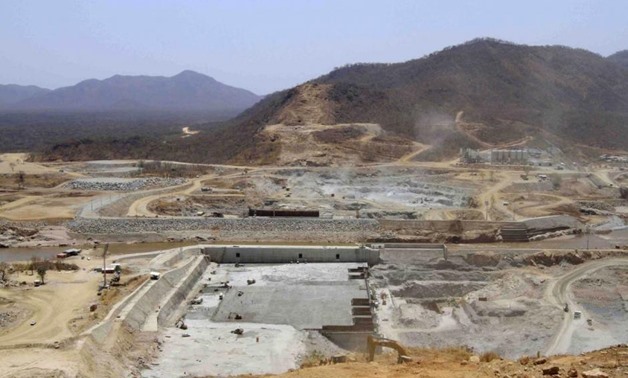
FILE- A general view shows construction activity on the Grand Renaissance dam in Guba Woreda, Benishangul Gumuz region in this March 16, 2014 file photo. REUTERS/Tiksa Negeri/Files
CAIRO - 16 November 2019: Egypt would host the second round of a four-meeting series between Egypt, Sudan and Ethiopia on the Grand Ethiopian Renaissance Dam [GERD] on December 2-3, announced Egyptian Minister of Water Resources and Irrigation Mohamed Abdel-Atti after the end of the first round in Addis Ababa on Saturday.
The first round of the meetings resumed on Saturday for the second day in a row, with participation of five representatives from the United States and the World Bank. Upon the outcomes of the Washington meeting on GERD on November 6, 2019, three countries have to hold the series of meetings to reach an agreement by January 15, 2020.
Abdel-Atti said that the three ministers discussed their proposals concerning the disputed technical issues.
During the first day of Addis Ababa meetings, Egypt affirmed that its proposal relies on the principles agreed on previously, said Egyptian Minister of Water Resources and Irrigation Mohamed Abdel-Atti in another statement on Saturday. He added that Egypt adheres to reaching a fair agreement on the technical issues.
“Egypt welcomed the participation of the US and WB brokers,” Abdel-Atti added, noting that a tremendous importance counts on this meeting to reach an agreement.
In his speech at the opening meeting, Ethiopian Minister of Water and Energy Seleshi Bekele invited Water Ministers of the other downstream countries [Egypt and Sudan] along with the US and WB representatives to pay a field visit to the under-construction dam, several media outlets reported. He called upon the mediators to keep the negotiation process confidential.
Sudanese Minister of Irrigation and Water Resources Yasser Abbas said in a statement on Thursday that Sudan’s stance towards the rules of filling the reservoir depends on the river hydrology concerning drought and rainwater seasons. He added that his country asked for an annual flow of 35 billion cubic meters of Nile water to the downstream countries over the period of reservoir filling.
As per the Egyptian proposal, 40 billion cubic meters of water should be allowed to reach the other two countries. Meanwhile, Ethiopia has proposed 31 billion cubic meters, said Abbas.
Egypt and Ethiopia are at loggerheads over the $4-billion dam; Cairo voiced concern over its water share [55.5 billion cubic meters] after Ethiopia started building the dam on the Blue Nile in May 2011. A series of tripartite talks between the two countries along with Sudan began in 2014. One year later, the three countries signed the Declaration of Principles, per which the downstream countries [Egypt and Sudan] should not be negatively affected by the construction of the dam.
However, Cairo has recently blamed Addis Ababa for hindering a final agreement concerning a technical problem, calling for activating the Article No. 10 of the Declaration of Principles, which stipulates that if the three countries could not find a solution to these differences, they have to ask for mediation.
Later, the United States sent an invitation to the three countries to resume the talks. Meetings were held with Foreign and Water Ministers of Egypt and Upper stream countries, in presence of United States Secretary of Treasure Steven Mnuchin and a representative from the World Bank,.
President Donald Trump praised a meeting with top representatives from the three countries, saying on his Twitter that it “went well and discussions will continue during the day!”
President Abdel Fatah El Sisi also lauded the constructive and pivotal role played by President Trump and the US, which reflects the depth of the strategic relations between Egypt and the United States, saying that this would contribute to reaching an agreement on the filling and operation of GERD and promoting stability and development in the East Africa region.


Comments
Leave a Comment